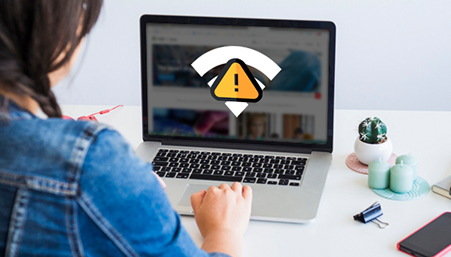Internet Goes Out Every Night At Same Time? Here's How To Fix It!

Fri, May 07, 2021 04:37 AM
Imagine coming home after a long day of work to actually relax and enjoy browsing the web at night, only to found out that the internet is not functioning properly. In the worst-case scenario, this condition could repeat itself every night at the same time. Isn't it something you'd find vexing?
Nobody needs their valuable free time to be disrupted by the buffering button. Assume you're watching television or playing a game as the internet begins to lag in the middle of it. Why is it like this keeps happening? Internet connectivity is often weakened at night due to a surge in internet traffic. This, in turn, has an effect on the overall quality of internet download and streaming activities.
Under the worst-case scenario, this might become a normal occurrence, with the internet going down entirely every night at the same time. There may be many causes for this problem, and these problems can be resolved in a variety of ways. Below are several troubleshooting techniques that have assisted users in resolving their internet access issues:
Internet Goes Out Every Night At Same Time!
The Router's Distance
Your internet access can be affected by the distance between your device and your wireless router. A reduction in speed may be caused by a greater difference between these two.
Your home wireless network, for example, is in the first-floor living room, and you're accessing the internet from your second-floor bedroom on your phone. Because of obstructions such as walls, doors, and space, the internet signal can be lost. This problem can be solved by purchasing a WiFi range extender or moving your wireless router to a more central position in your house.
Also Read: How Much Internet Speed Does Your Smart Home Need?
Internet Rush Hour
Due to the fact that cable internet customers share their bandwidth with other cable users who have the same internet subscription, internet rush hour is a common problem for them. As a result of a spike in internet traffic at a given time, the access speed for anyone connecting to the internet network at that time reduces.
Since everybody is away from home during the day for work, the battle for bandwidth usually begins at night. It's no surprise that the subscription service is buffering when everybody gets home at the same time at night.
If your neighbors are heavy internet users, your signal can suffer as a result. Similarly, if you and your neighbors have the same wireless frequency, this will happen. To stop signal interference, try switching to a separate frequency or channel.
Aside from that, you have the option of picking a certain internet access peak time for yourself. This will serve to reduce the amount of competition for internet access from your neighbors. Take note about what time of night your internet service providers are bad, and then stop using it for activities that need higher internet speed at that time.
Changing the location of the router to avoid wireless interference
Electromagnetic signals are emitted from certain household equipment, such as microwave ovens and cordless phones. This will cause the WiFi signals to be disrupted, resulting in a signal loss.
To boost your signals, you should switch your router to a remote location away from “noisy” electromagnetic fields.

Use 5 GHz Wi-Fi
A dual-band router is one that transmits two different Wi-Fi frequencies at different speeds: 2.4 GHz and 5 GHz. The 2.4 GHz band can deliver up to 600 Mpbs, while the 5 GHz band can deliver up to 1300 Mpbs.
For a simple internet connection, most computers automatically connect to the 2.4GHz band. Switching to the 5GHz band is recommended if you choose to increase the efficiency of internet activities such as internet gaming and downloading.
Switch off WiFi on all other devices
The number of devices that can attach to a router is usually restricted. This is intended to ensure a stable internet connection. The router is placed under more strain as a result of downloading and streaming. If your router becomes overwhelmed, it can restrict your connection.
Your router can drop one or more of your connecting devices to maintain a strong internet connection. To avoid router congestion, it's a smart idea to toggle off WiFi connectivity on unused computers.
Changing Internet Service Provider
If neither of the above tips succeeded for you, it's time to rethink your internet plan. Since your new internet service does not have a speed that suits your needs, it may be the source of your nightly internet mishap.
Your local internet service provider (ISP) can change your internet speeds during peak use hours to satisfy other users and minimize the internet traffic load. To see if your broadband speed is consistent with your internet needs, you should take an internet speed test.
If you want unrestricted internet access, you should be upgrading to a premium package. It can, however, be expensive. Switching to a different ISP or upgrading the internet access type, such as DSL or fiber-optic internet connection, are two other choices.
Final Thoughts
This is a general problem that can be resolved in a variety of ways. Hopefully, these ideas were helpful in resolving your internet access problems that occurred at the same time every night.
Featured Plan

Bundles starting from $64.99/mo.
Optimum internet plans offer 1000 Mbps of ultra internet speed with Altice Fibe. You will be able to enjoy 420 plus channels in 4K ultra HD. Optimum is the fourth-largest cable provider in the United States.
View More Deals! (833) 396-32123